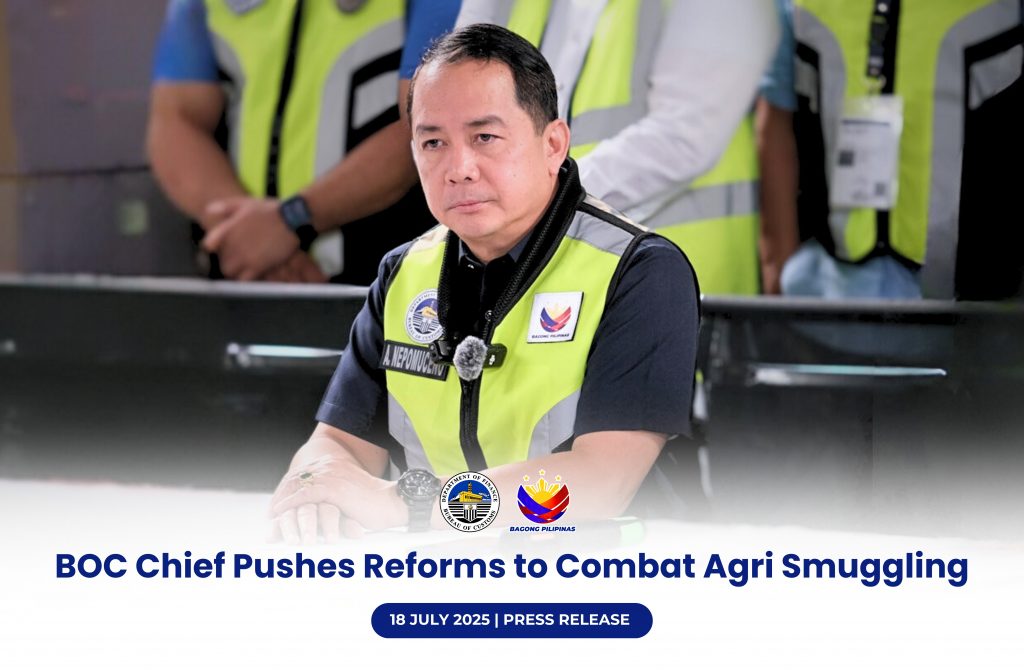- GOVPH
- About BOC
- Issuances
- Aduana Library
- Memoranda
- Memoranda for Reference Values
- Customs Administrative Order (CAO)
- Customs Administrative Order (CAO) 2025
- CUSTOMS ADMINISTRATIVE ORDER (CAO) 2024
- Customs Administrative Order (CAO) 2023
- Customs Administrative Order (CAO) 2022
- Customs Administrative Order (CAO) 2021
- Customs Administrative Order (CAO) 2020
- Customs Administrative Order (CAO) 2019
- Customs Administrative Order (CAO) 2018 and Older
- Customs Memorandum Order (CMO)
- Customs Memorandum Circular (CMC)
- Customs Memorandum Circular (CMC) 2025
- Customs Memorandum Circular (CMC) 2024
- Customs Memorandum Circular (CMC) 2023
- Customs Memorandum Circular (CMC) 2022
- Customs Memorandum Circular (CMC) 2021
- Customs Memorandum Circular (CMC) 2020
- Customs Memorandum Circular (CMC) 2019
- Customs Memorandum Circular (CMC) 2018 and Older
- Customs Special Order (CSO)
- Custom Training Circular (CTC)
- Joint Memorandum Orders (JMO)
- Trade
- News Room
- Port Updates
- HR Corner
- Quicklinks
- Infographics
- Bureau of Customs Webinar
- Auction and Sales
- Bid Opportunities
- Invitation to Bid / Request for Quotation / Invitation for Negotiated Procurement / Notice to Conduct Direct Contracting – 2023
- Invitation to Bid / Request for Quotation / Invitation for Negotiated Procurement / Notice to Conduct Direct Contracting – 2022
- Invitation to Bid / Request for Quotation / Invitation for Negotiated Procurement / Notice to Conduct Direct Contracting – 2021
- Invitation to Bid / Request for Quotation / Invitation for Negotiated Procurement / Notice to Conduct Direct Contracting – 2020
- Invitation to Bid / Request for Quotation / Invitation for Negotiated Procurement / Notice to Conduct Direct Contracting – 2019
- Invitation to Bid / Request for Quotation / Invitation for Negotiated Procurement / Notice to Conduct Direct Contracting
- Bid Documents
- Bid Supplement
- Summary of Awarded Contracts
- Summary of Contracts Awarded 2023
- Summary of Contracts Awarded 2022
- Summary of Contracts Awarded 2021
- Summary of Contracts Awarded 2020
- Summary of Contracts Awarded 2019
- Summary of Contracts Awarded 2018
- Summary of Contracts Awarded 2017
- Summary of Contracts Awarded 2016
- Summary of Contracts Awarded 2015
- Summary of Contracts Awarded 2014
- Summary of Contracts Awarded 2013
- Annual Procurement Plan
- Customs Knowledge Resources
- References
- Gender Equality and Diversity
- Philippine National Trade Repository
- Philippine Tariff Finder
- Authorized Economic Operator
BOC Chief Pushes Reforms to Combat Agri Smuggling
Determined to protect the country’s food security and agricultural sector, the Bureau of Customs (BOC), under the leadership of Commissioner Ariel F. Nepomuceno, is advancing a multi-pronged approach to eliminate agricultural smuggling. These efforts include the full automation of customs processes, the proposed implementation of a Pre-Shipment Survey mechanism, and the strict enforcement of the Anti-Agricultural Economic Sabotage Act.
Commissioner Nepomuceno emphasized that curbing agricultural smuggling is not only a matter of enforcement but also a question of system integrity. “We must modernize our systems, tighten our enforcement, and transform our workforce to truly protect our borders and support our farmers,” he said.
To eliminate human discretion and reduce opportunities for corruption, the BOC is accelerating the full automation of customs procedures, especially in the processing and clearance of agricultural imports. Automation will enable real-time tracking, automated risk management, and digital verification, significantly improving transparency and operational efficiency.
As an added safeguard, the Bureau is reinforcing stricter and risk-based monitoring of shipments originating from identified high-risk countries with a history of illicit importation or agricultural smuggling. Enhanced profiling and targeted inspections are being applied to detect and intercept suspicious shipments before they reach the Philippine market.
As part of its broader reform agenda, the BOC is also studying the possible adoption of a Pre-Shipment Survey mechanism. This proposed measure would require goods to undergo inspection and verification before leaving the exporting country. While the concept is still under evaluation, it is being considered as a potential solution to address issues of misdeclaration, underdeclaration, and technical smuggling before the goods reach Philippine shores.
With the enactment of Republic Act No. 12022, also known as the Anti-Agricultural Economic Sabotage Act, the BOC is reinforcing its enforcement efforts. The law imposes severe penalties, including non-bailable charges, for individuals found guilty of smuggling agricultural goods worth at least ten million pesos. The Bureau has since intensified its inspection, alert, and seizure operations to detect violations and pursue legal action against offenders.
In recent months, the BOC has successfully intercepted several attempts to smuggle agricultural products, including misdeclared onions, carrots, and frozen fish at major ports such as Subic and Manila. One major operation, conducted in partnership with the Department of Agriculture (DA), uncovered 10 containers falsely declared as “chicken poppers” which were actually loaded with smuggled carrots and onions valued at over 100 million pesos.
These operational successes underscore the BOC’s strengthened collaboration with law enforcement agencies such as the Philippine National Police, National Bureau of Investigation, and Philippine Coast Guard. The Bureau also works closely with the Department of Agriculture to ensure that only lawful and properly declared agricultural imports are allowed into the country.
Beyond enforcement, Commissioner Nepomuceno is committed to building a culture of integrity and discipline among BOC personnel. From entry-level staff to high-ranking officials, all employees are expected to uphold the values of professionalism and accountability. “This is not just about stopping smuggling. It is about transforming the institution and building a Bureau that the Filipino people can trust,” he added.
Commissioner Nepomuceno reiterated the Bureau’s commitment to Filipino farmers
“Every smuggled onion, carrot, or sack of rice that slips through our borders is a direct blow to the hardworking hands that feed our nation. The Bureau of Customs will stand firm with our farmers. We are committed to guarding our borders not just for compliance, but for justice, fairness, and the dignity of Filipino agricultural workers.”
The Bureau of Customs remains fully committed to upholding fair trade, protecting local industries, and ensuring that the benefits of lawful trade reach every Filipino.

ABOUT GOVPH
All content is in the public domain unless otherwise stated.






